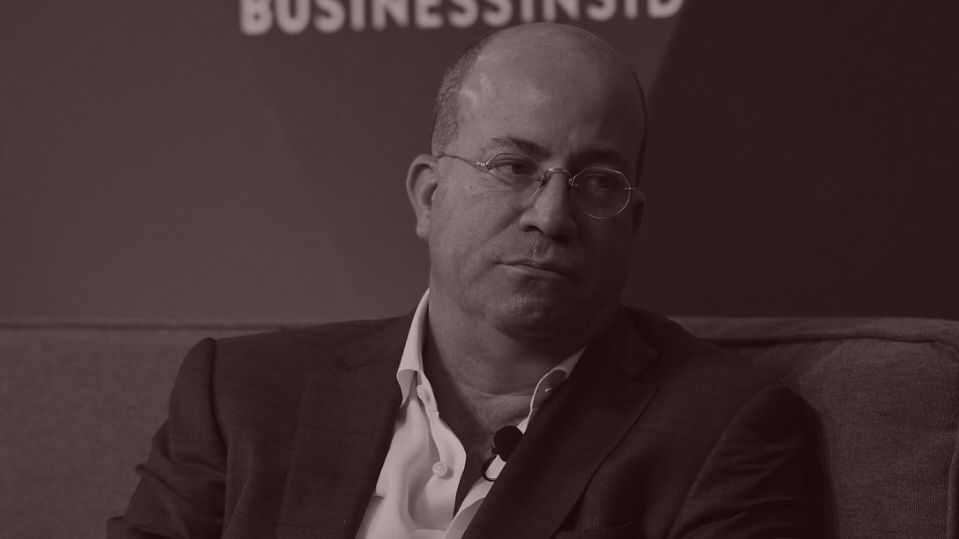 |
|
Greetings from Los Angeles, and welcome back to In the Room. In tonight’s email, a talmudic reading of Jeff Zucker’s latest comments on a possible (but highly unfathomable) CNN acquisition, which set off a flurry of speculation—no, the asset isn’t for sale, yet—and highlighted some of the broader truths about the state of the network, its parentco, and the media business writ large.
Also, we’ve updated our Member Information questions for subscribers. If you can, take a few seconds to fill out your responses—it will help us develop new products tailored to your interests as Puck continues to grow. Just click here, and make sure you’re logged in. Thanks.
But first…
👀 The gift of Godwin: In Wednesday’s email, I noted that now-former ABC News president Kim Godwin had managed to dispatch not one but two camera crews to cover the reveal of a record-high $237 million donation to her beloved alma mater, Florida A&M University. Of course, this was the final coda to a tenure in which Godwin repeatedly leveraged her position to reward the school: a $1 million corporate gift, special internship programs, sweatshirts and merch for the entire leadership team, honorary degrees, etcetera. But, as it turns out, FAMU has now been forced to put the $237 million gift “on hold” amid skepticism about the transaction and the mysterious 30-year-old donor. Now that is a story that ABC News should cover!
✏️ Calling Jake Tapper…: A broadcast news source has alerted me to an impending talent shortage: With Trump on trial, and Senator Bob Menendez and Hunter Biden heading to their own respective trials, there is an apparent shortage of fast and reliable courtroom sketch artists. CNN’s Jake Tapper, a known sketch hobbyist, was kind enough to offer his services this week. Maybe Emma Allen, heir to the Mankoff throne, can send over a few cartoonists from One World Trade?
|
 |
| The Zucker Savior Myth |
| The endurance of the “Will Jeff buy CNN?” fantasy, which was stoked again this week, highlights the uncertain state of the media industry, and a few enduring truths about Zucker, too. He may have reinvented himself as an investor, but he remains an operator at heart. And, if given the opportunity, he’d probably be back in the control room in a heartbeat. |
|
|
|
| Jeff Zucker was being a bit provocative this week, onstage at the Wall Street Journal C.E.O. Council Summit, when he said he’s heard from people who think he should “come back in and buy CNN.” Zucker is no doubt keenly aware of the rumor—or the in-crowd cocktail party fantasy, really—that has persisted in the years since his abrupt defenestration from Hudson Yards: that one day, he might swoop in as the public face of an investment group and buy the cable news network from Warner Bros. Discovery. For the critics who thought he’d polarized and poop cruise-ified Ted Turner’s pioneering news network, such a return would be an unwelcome scenario. But for the many, many loyal employees who were so memorably traumatized by his termination, it would be akin to the Second Coming, and I’m barely being hyperbolic. “I know that, for a lot of people,” Zucker teased, “this is how the movie ends.”
Zucker, now a media investor and C.E.O. of RedBird IMI, managed to fuel the speculation while ostensibly extinguishing it. “It’s not something that we’ve contemplated at this point,” he told the Journal’s Jessica Toonkel. “It’s not something that we’ve ever looked at, in any formal way, in any manner.” Moreover, he continued, “CNN is not for sale, as far I know.” But, he added, “like anything else in the news and information space, if it became available, if it were for sale, of course we would look at it.” Of course.
The endurance of the “Will Jeff buy CNN?” rumor—despite the fact that the asset isn’t for sale, at least not yet—highlights a few broader themes about the uncertain state of the media industry today, and a few enduring truths about Zucker, as well. To be sure, Zucker never fully recovered from his ouster, nor has he been able to excise his nostalgia for running a major media company, be it NBCUniversal or CNN. With RedBird IMI, he has cast himself as an investor and portfolio builder, and, for a fleeting moment, the possible owner of a British broadsheet. But the truth, as anyone who knows him will tell you, is that he remains an operator at heart, and, if given the opportunity—the right opportunity, with a big enough budget and total control of the business—he’d be back in the control room in a second.
And CNN hasn’t fully recovered from Zucker’s exit either. The wistfulness stems, in part, from the fact that Zucker supercharged the careers of so many anchors, correspondents, producers, and executives who are still there today. But he also presided over an era when CNN was thriving: record ratings, record profits, and, crucially, a sense of profound relevance. The talent were happy and motivated, and it seemed like they were in the center of the action. And, of course, Zucker’s strengths were only accentuated by the subsequent ineptitude of Chris Licht, but you know how that story ended.
In retrospect, the Zucker-Licht dichotomy actually exposed a far greater anxiety across the entire television news business. Zucker was in many ways the last of television’s bold impresarios, the last great leader—at least in the eyes of his staff and many across the industry. His departure was thus symbolic of a larger trend away from the creative and competitive (and, yes, sometimes very controversial) producers of the Roone Arledge school—who wielded big production budgets and doled out seven- or eight-figure talent salaries—and toward the often inept and ineffective conference-circuit careerists who had been given a mandate to cut costs and manage decline. Indeed, the drop-off from Andy Lack to Cesar Conde, or Ben Sherwood to Kim Godwin, was steeper and more precipitous—and, frankly, more depressing—than anyone expected.
“I do think that leadership matters,” Zucker said at the WSJ summit. “And I think we’ve seen what happens when newsrooms and news organizations don’t have good leadership.” He was talking about Licht, obviously, but he was also talking about damn near everyone. At the same time, he was perhaps hinting at another, more comprehensive thesis: that it didn’t have to get this bad; that shifting business models shouldn’t necessitate mediocrity; that if you actually lead and produce and program like you give a damn, you can maintain relevance and revenue on old and new platforms alike.
In any event, the psychosis permeating this industry also helps to explain why the initial thrill surrounding Mark Thompson’s arrival at CNN has given way to a far more cautious optimism or, in some corners of the company, pessimism and impatience for a coherent articulation of his plan. Or, to put it more aptly, a dawning realization that, whatever his strategy, there is no magic button he can press that erases all the business’s problems—declining ratings, multiplatform realities, a perceptible loss of oomph, etcetera—in one fell swoop.
Indeed, Thompson has made clear that pivoting a 44-year-old linear network to a digital-first philosophy will take years, not months. While that is unquestionably true, his refusal to address the acute anxieties of TV veterans—ceding the once-competitive morning hours, refusing to fix a lackluster primetime, etcetera—has only reinforced the fears that have persisted since Jason Kilar showed Zucker the door.
|
|
|
| Seven months in, Thompson’s digital plan is still very much in development. He and his deputy Alex MacCallum have been busy identifying coverage areas where they can build talent-centric verticals across linear, streaming, and digital, with a subscription offering for the most dedicated audience: a global affairs product built around Fareed Zakaria, perhaps a health vertical built around Sanjay Gupta, a climate vertical built around Bill Weir, you get it. They are also hoping to build a business vertical, and, I’m told, have even dusted off the old Zucker-era CNN Money sales deck to review how they’d approached that product in the past.
It turns out this strategy is actually very reminiscent of a plan that Zucker and his digital deputy, Andrew Morse, first rolled out in 2017. At the time, a Wall Street Journal article noted that Zucker and Morse had already invested “in digital ‘verticals,’ or distinct web brands” and were now preparing “the launch of tiered subscription offerings” to “give subscribers access to special content on topic-specific verticals, such as CNN Money and CNN Politics, built around network personalities.” In essence, the plan Thompson and MacCallum are currently at work on.
The Zucker-Morse plan was also the first step toward a direct-to-consumer strategy that would ultimately manifest CNN+, which MacCallum herself helped architect. And while the CNN+ content slate was rightly eviscerated on Twitter—who wants a Jake Tapper book club?—before being killed in the crib by David Zaslav and Warner Bros. Discovery, it also laid the groundwork for a far more ambitious D.T.C. strategy that Thompson now intends to draw from. Indeed, in a leadership meeting this week, I’m told Thompson acknowledged that CNN+ had been a smart idea in theory and that he intended to draw on the previous regime’s research and keep some of its best pieces. (Thus, Kate Bolduan’s 5 Things video series.)
There are other, subtle signs of the Zucker sensibility returning to CNN. Between Anderson Cooper and Dana Bash speaking out in quite opinionated segments on the issues of the day, and Brian Stelter and Jeffrey Toobin repeatedly showing up on-air, it’s hard not to come to the conclusion that Zaz and John Malone have all but given up on their early attempt to recenter the politics of the network and strip it of voice. The notable differences are that the network has lost Don Lemon, waved the white flag in mornings, and, thanks to Licht, effectively alienated the core audience—which is perhaps why so few people have noticed. Above all else, it’s a reminder of just how much time CNN wasted in tasking an ill-equipped leader with an ill-advised mandate.
Anyway, until Thompson both articulates and executes his vision, the Zucker rumors are likely to persist, whether Zaslav intends to sell it or not. And that highlights the most significant aspect of all this, which is the health of the CNN parentco, itself. WBD has lost more than two-thirds of its value since its formation, and all available evidence suggests that Zaslav’s north star is debt reduction and free cash flow. (And, of course, he’s currently facing the likely prospect of a high-profile bidding war for his NBA rights that may force him to spend north of $25 billion over the next decade.)
Perhaps Zaz really is a genius who sees where the industry is headed and is wisely unsentimental about the need to right-size his assets. Or maybe he’s not nearly as smart as his annual comp suggests, and will inadvertently drive the value of the company down even further. Who knows, but it’s not out of the question that he may one day reconsider offloading CNN, at which point perhaps Zucker will “take a look.” But the reality is that it will be hard to find an investor who wants to revive a largely linear asset in terminal decline. Zucker may still be an operator at heart, but he probably knows that better than anyone.
|
|
|
|
| FOUR STORIES WE’RE TALKING ABOUT |
|
|
|

|
 |
|
|
|
Need help? Review our FAQs
page or contact
us for assistance. For brand partnerships, email ads@puck.news.
|
|
You received this email because you signed up to receive emails from Puck, or as part of your Puck account associated with . To stop receiving this newsletter and/or manage all your email preferences, click here.
|
|
Puck is published by Heat Media LLC. 227 W 17th St New York, NY 10011.
|
|
|
|







